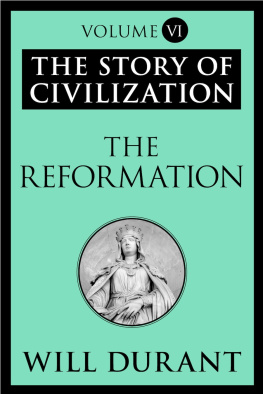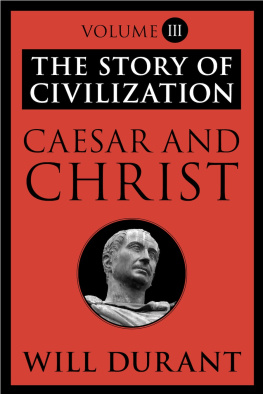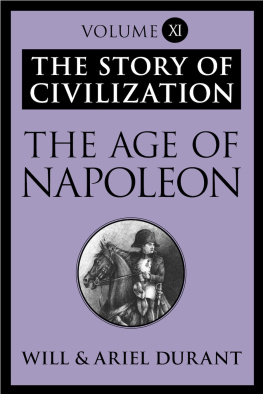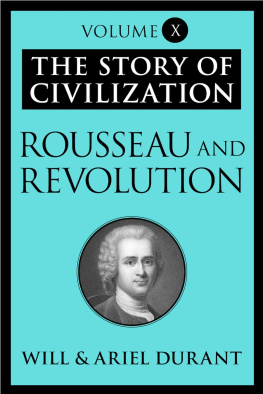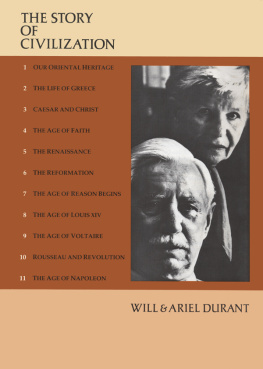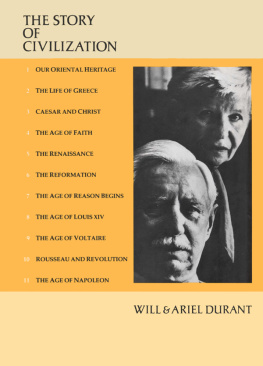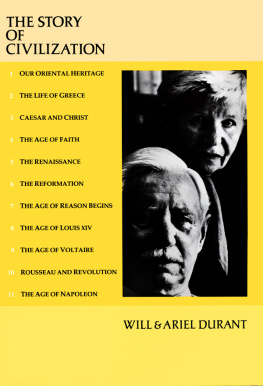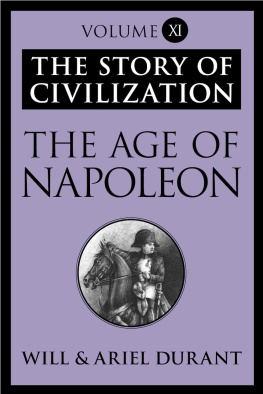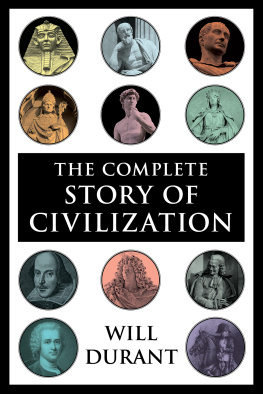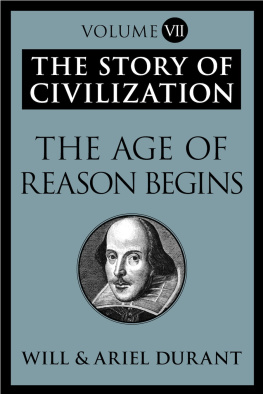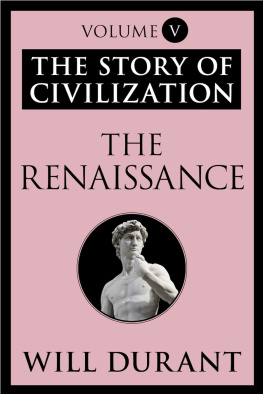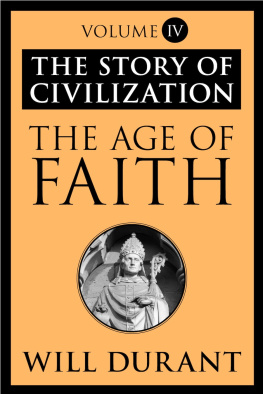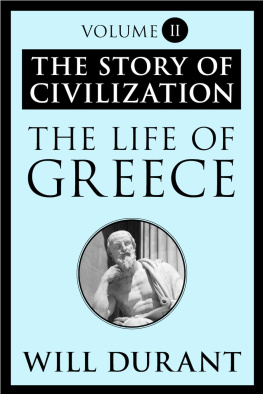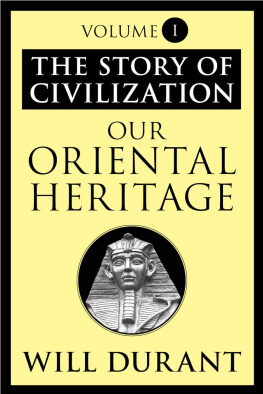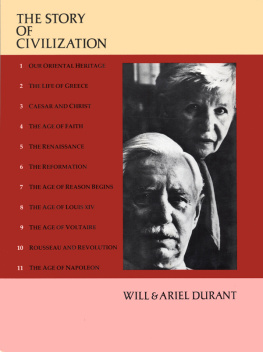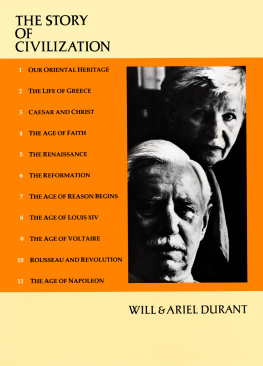Will Durant - The Story of Civilization Volume VI: The Reformation
Here you can read online Will Durant - The Story of Civilization Volume VI: The Reformation full text of the book (entire story) in english for free. Download pdf and epub, get meaning, cover and reviews about this ebook. year: 0, publisher: Simon & Schuster, genre: History. Description of the work, (preface) as well as reviews are available. Best literature library LitArk.com created for fans of good reading and offers a wide selection of genres:
Romance novel
Science fiction
Adventure
Detective
Science
History
Home and family
Prose
Art
Politics
Computer
Non-fiction
Religion
Business
Children
Humor
Choose a favorite category and find really read worthwhile books. Enjoy immersion in the world of imagination, feel the emotions of the characters or learn something new for yourself, make an fascinating discovery.
- Book:The Story of Civilization Volume VI: The Reformation
- Author:
- Publisher:Simon & Schuster
- Genre:
- Year:0
- Rating:5 / 5
- Favourites:Add to favourites
- Your mark:
- 100
- 1
- 2
- 3
- 4
- 5
The Story of Civilization Volume VI: The Reformation: summary, description and annotation
We offer to read an annotation, description, summary or preface (depends on what the author of the book "The Story of Civilization Volume VI: The Reformation" wrote himself). If you haven't found the necessary information about the book — write in the comments, we will try to find it.
The Story of Civilization Volume VI: The Reformation — read online for free the complete book (whole text) full work
Below is the text of the book, divided by pages. System saving the place of the last page read, allows you to conveniently read the book "The Story of Civilization Volume VI: The Reformation" online for free, without having to search again every time where you left off. Put a bookmark, and you can go to the page where you finished reading at any time.
Font size:
Interval:
Bookmark:

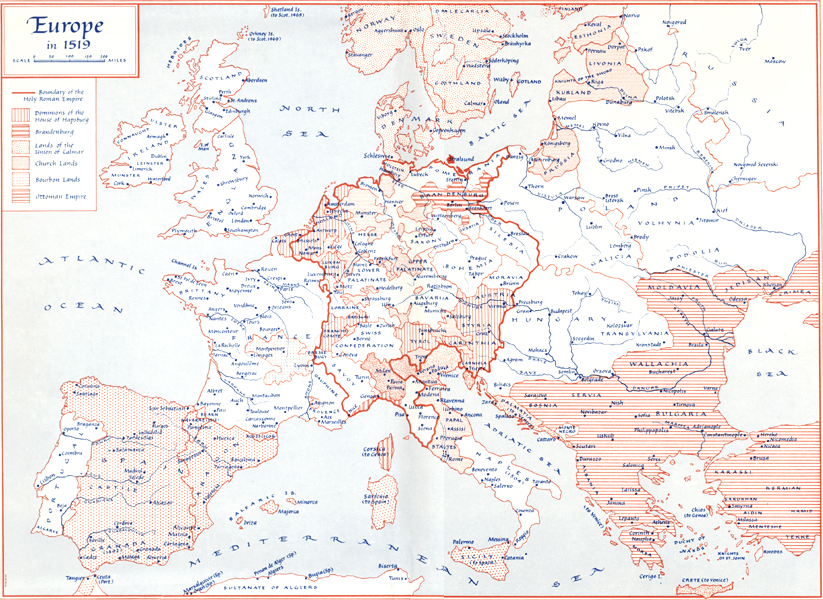
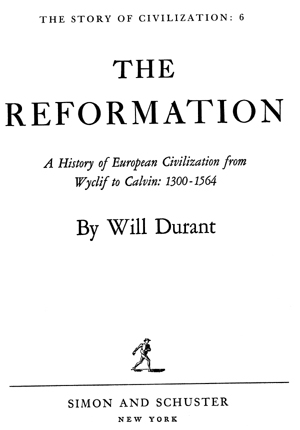
TO LOUIS, MOLLIE, AND ERIC
T HE prospective reader deserves a friendly notice that The Reformation is not quite an honest title for this book. An accurate title would be: A History of European Civilization Outside of Italy from 1300 to 1564, or Thereabouts, Including the History of Religion in Italy and an Incidental View of Islamic and Judaic Civilization in Europe, Africa, and Western Asia. Why so meandering a thematic frontier? Because Volume IV (The Age of Faith) in this Story of Civilization brought European history only to 1300, and Volume V (The Renaissance) confined itself to Italy, 1304-1576, deferring the Italian echoes of the Reformation. So this Volume VI must begin at 1300; and the reader will be amused to find that Luther arrives on the scene only after a third of the tale has been told. But let us privately agree that the Reformation really began with John Wyclif and Louis of Bavaria in the fourteenth century, progressed with John Huss in the fifteenth, and culminated explosively in the sixteenth with the reckless monk of Wittenberg. Those whose present interest is only in the religious revolution may omit Chapters III-VI and IX-X without irreparable loss.
The Reformation, then, is the central, but not the only, subject of this book. We begin by considering religion in general, its functions in the soul and the group, and the conditions and problems of the Roman Catholic Church in the two centuries before Luther. We shall watch England in 1376-82, Germany in 1320-47, and Bohemia in 1402-85, rehearsing the ideas and conflicts of the Lutheran Reformation; and as we proceed we shall note how social revolution, with communistic aspirations, marched hand in hand with the religious revolt. We shall weakly echo Gibbons chapter on the fall of Constantinople, and shall perceive how the advance of the Turks to the gates of Vienna made it possible for one man to defy at once an emperor and a pope. We shall consider sympathetically the efforts of Erasmus for the peaceful self-reform of the Church. We shall study Germany on the eve of Luther, and may thereby come to understand how inevitable he was when he came. In we shall make an experiment in empathyshall attempt to view the Reformation from the standpoint of the imperiled Church; and we shall be forced to admire the calm audacity with which she weathered the encompassing storm. In a brief epilogue we shall try to see the Renaissance and the Reformation, Catholicism and the Enlightenment, in the large perspective of modern history and thought.
It is a fascinating but difficult subject, for almost every word that one may write about it can be disputed or give offense. I have tried to be impartial, though I know that a mans past always colors his views, and that nothing is so irritating as impartiality. The reader should be warned that I was brought up as a fervent Catholic, and that I retain grateful memories of the devoted secular priests, and learned Jesuits, and kindly nuns who bore so patiently with my brash youth; but he should note, too, that I derived much of my education from lecturing for thirteen years in a Presbyterian church under the tolerant auspices of sterling Protestants like Jonathan C. Day, William Adams Brown, Henry Sloane Coffin, and Edmund Chaffee; and that many of my most faithful auditors in that Presbyterian church were Jews whose thirst for education and understanding gave me a new insight into their people. Less than any man have I excuse for prejudice; and I feel for all creeds the warm sympathy of one who has come to learn that even the trust in reason is a precarious faith, and that we are all fragments of darkness groping for the sun. I know no more about the ultimates than the simplest urchin in the streets.
I thank Dr. Arthur Upham Pope, founder of the Asia Institute, for correcting some of the errors in the chapters on Islam; Dr. Gerson Cohen, of the Jewish Theological Seminary of America, for checking the pages on the Jews; my friend Harry Kaufman of Los Angeles for reviewing the section on music; and, pleno cum corde, my wife for her unremitting aid and illuminating comments at every stage in our co-operative labor on this book.
If the Reaper will stay his hand, there will be a concluding Volume VII, The Age of Reason, which should appear some five years hence, and should carry the story of civilization to Napoleon. There we shall make our bow and retire, deeply grateful to all who have borne the weight of these tomes on their hands, and have forgiven numberless errors in our attempt to unravel the present into its constituent past. For the present is the past rolled up for action, and the past is the present unrolled for our understanding.
W ILL D URANT
Los Angeles, May 12,1957
1. Dates of birth and death are usually omitted from the text, but will be found in the Index.
2. The religious standpoint of authors quoted or referred to in the text is indicated in the Bibliography by the letters C, J, P, or R, for Catholic, Jewish, Protestant, or rationalist.
3. Passages intended for resolute students rather than for the general reader are indicated by reduced type.
4. To make this volume an independent unit some passages from The Renaissanee , on the history of the Church before the Reformation, have been summarized in the opening chapter.
5. The location of works of art, when not indicated in the text, will usually be found in the Index under the artists name. The name of a city will, in such allocations, be used to indicate its leading gallery, as follows:
AmsterdamRijksmuseum
AugsburgGemldegalerie
BarcelonaMuseum of Catalan Art
BaselOffentliche Kunstsammlung
BergamoAccademia Carrara
BerlinKaiser-Friedrich Museum
BremenKunsthalle
BrusselsMuseum
BudapestMuseum of Fine Arts
ChicagoArt Institute
CincinnatiArt Museum
ClevelandMuseum of Art
ColmarMuseum Unterlinden
CologneWallraf Richarts Museum
CopenhagenStatens Museum for Kunst
DetroitInstitute of Art
FrankfurtStdelsches Kunstinstitut
GenevaMuse dArt et dHistoire
The HagueMauritshuis
LeningradHermitage
LisbonNational Museum
LondonNational Gallery
MadridPrado
MilanBrera
MinneapolisInstitute of Arts
MunichHaus der Kunst
NaplesMuseo Nazionale
New YorkMetropolitan Museum of Art
NurembergGermanisches National Museum
PhiladelphiaJohnson Collection
PragueState Gallery
San DiegoFine Arts Gallery
StockholmNational Museum
ToledoMuseum of Art
ViennaKunsthistorisches Museum
WashingtonNational Gallery
WorcesterArt Museum
The galleries of Florence will be distinguished by their names, Uffizi or Pitti, as will the Borghese and Galleria Nazionale in Rome.
6. This volume will reckon the crown, the livre, the florin, and the ducat of the fourteenth and fifteenth centuries at $25.00 in the money of the United States in 1954; the franc and the shilling at $5.00; the cu at $15.00; the mark at $66.67; the pound sterling at $100.00. These equivalents are loose guesswork, and repeated debasements of the currencies make them still more hazardous. We note that in 1390 a student could be boarded at Oxford for two shillings a week;
Font size:
Interval:
Bookmark:
Similar books «The Story of Civilization Volume VI: The Reformation»
Look at similar books to The Story of Civilization Volume VI: The Reformation. We have selected literature similar in name and meaning in the hope of providing readers with more options to find new, interesting, not yet read works.
Discussion, reviews of the book The Story of Civilization Volume VI: The Reformation and just readers' own opinions. Leave your comments, write what you think about the work, its meaning or the main characters. Specify what exactly you liked and what you didn't like, and why you think so.

